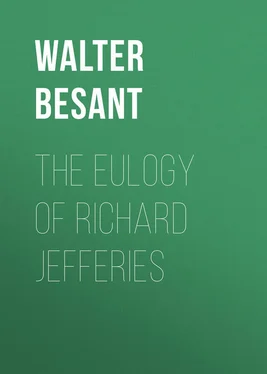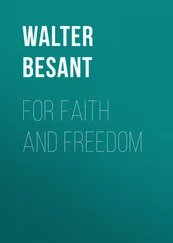Walter Besant - The Eulogy of Richard Jefferies
Здесь есть возможность читать онлайн «Walter Besant - The Eulogy of Richard Jefferies» — ознакомительный отрывок электронной книги совершенно бесплатно, а после прочтения отрывка купить полную версию. В некоторых случаях можно слушать аудио, скачать через торрент в формате fb2 и присутствует краткое содержание. Жанр: foreign_antique, foreign_prose, на английском языке. Описание произведения, (предисловие) а так же отзывы посетителей доступны на портале библиотеки ЛибКат.
- Название:The Eulogy of Richard Jefferies
- Автор:
- Жанр:
- Год:неизвестен
- ISBN:нет данных
- Рейтинг книги:5 / 5. Голосов: 1
-
Избранное:Добавить в избранное
- Отзывы:
-
Ваша оценка:
- 100
- 1
- 2
- 3
- 4
- 5
The Eulogy of Richard Jefferies: краткое содержание, описание и аннотация
Предлагаем к чтению аннотацию, описание, краткое содержание или предисловие (зависит от того, что написал сам автор книги «The Eulogy of Richard Jefferies»). Если вы не нашли необходимую информацию о книге — напишите в комментариях, мы постараемся отыскать её.
The Eulogy of Richard Jefferies — читать онлайн ознакомительный отрывок
Ниже представлен текст книги, разбитый по страницам. Система сохранения места последней прочитанной страницы, позволяет с удобством читать онлайн бесплатно книгу «The Eulogy of Richard Jefferies», без необходимости каждый раз заново искать на чём Вы остановились. Поставьте закладку, и сможете в любой момент перейти на страницу, на которой закончили чтение.
Интервал:
Закладка:
Why, in the very last paper which he ever wrote – it appeared in Longman's Magazine two months after his death – his memory goes back to the hamlet where he was born. He recalls the cottage where John Brown lived – you can see it still, close to Coate – as well as that where Job lived who kept the shop and was always buying and selling; and of the water-bailiff who looked after the great pond:
"There were one or two old boats, and he used to leave the oars leaning against a wall at the side of the house. These oars looked like fragments of a wreck, broken and irregular. The right-hand scull was heavy as if made of ironwood, the blade broad and spoon-shaped, so as to have a most powerful grip of the water. The left-hand scull was light and slender, with a narrow blade like a marrow-scoop; so when you had the punt, you had to pull very hard with your left hand and gently with the right to get the forces equal. The punt had a list of its own, and no matter how you rowed, it would still make leeway. Those who did not know its character were perpetually trying to get this crooked wake straight, and consequently went round and round exactly like the whirligig beetle. Those who knew used to let the leeway proceed a good way and then alter it, so as to act in the other direction like an elongated zigzag. These sculls the old fellow would bring you as if they were great treasures, and watch you off in the punt as if he was parting with his dearest. At that date it was no little matter to coax him round to unchain his vessel. You had to take an interest in the garden, in the baits, and the weather, and be very humble; then perhaps he would tell you he did not want it for the trimmers, or the withy, or the flags, and you might have it for an hour as far as he could see; 'did not think my lord's steward would come over that morning; of course, if he did you must come in,' and so on; and if the stars were propitious, by-the-bye, the punt was got afloat."
Then the writer – he was a dying man – sings his song of lament because the past is past – and dead. All that is past, and that we shall never see again, is dead. The brook that used to leap and run and chatter – it is dead. The trees that used to put on new leaves every spring – they are dead. All is dead and swept away, hamlet and cottage, hillside and coppice, field and hedge.
"I think I have heard that the oaks are down. They may be standing or down, it matters nothing to me; the leaves I last saw upon them are gone for evermore, nor shall I ever see them come there again ruddy in spring. I would not see them again even if I could; they could never look again as they used to do. There are too many memories there. The happiest days become the saddest afterwards; let us never go back, lest we too die. There are no such oaks anywhere else, none so tall and straight, and with such massive heads, on which the sun used to shine as if on the globe of the earth, one side in shadow, the other in bright light. How often I have looked at oaks since, and yet have never been able to get the same effect from them! Like an old author printed in other type, the words are the same, but the sentiment is different. The brooks have ceased to run. There is no music now at the old hatch where we used to sit in danger of our lives, happy as kings, on the narrow bar over the deep water. The barred pike that used to come up in such numbers are no more among the flags. The perch used to drift down the stream, and then bring up again. The sun shone there for a very long time, and the water rippled and sang, and it always seemed to me that I could feel the rippling and the singing and the sparkling back through the centuries. The brook is dead, for when man goes nature ends. I dare say there is water there still, but it is not the brook; the brook is gone like John Brown's soul. There used to be clouds over the fields, white clouds in blue summer skies. I have lived a good deal on clouds; they have been meat to me often; they bring something to the spirit which even the trees do not. I see clouds now sometimes when the iron grip of hell permits for a minute or two; they are very different clouds, and speak differently. I long for some of the old clouds that had no memories. There were nights in those times over those fields, not darkness, but Night, full of glowing suns and glowing richness of life that sprang up to meet them. The nights are there still; they are everywhere, nothing local in the night; but it is not the Night to me seen through the window."
Nobody believes him, he says. People ask him if such a village ever existed – of course, it never existed. What beautiful picture ever really existed save in the sunrise and in the sunset sky? Those living in the place about which these wonderful things are written look at each other in amazement, and ask what they mean. All this about Coate? Why, here are only half a dozen cottages, mean and squalid, with thatched roofs; and beyond the hedge are only fields with a great pond and bare hills beyond. "No one else," says Jefferies, "seems to have seen the sparkle on the brook, or heard the music at the hatch, or to have felt back through the centuries; and when I try to describe these things to them they look at me with stolid incredulity. No one seems to understand how I got food from the clouds, nor what there was in the night, nor why it is not so good to look out of window. They turn their faces away from me, so that perhaps, after all, I was mistaken, and there never was any such place, or any such meadows, and I was never there. And perhaps in course of time I shall find out also, when I pass away physically, that as a matter of fact there never was any earth." That, indeed, will be the most curious discovery possible in the after-world. No earth – then no Coate; no "Wild Life in a Southern County," and no "Gamekeeper at Home," because there has never been any home for any gamekeeper.
I have dwelt at some length upon these early years of Jefferies' life because they are all-important. They explain the whole of his after-life; they show how the book of Nature was laid open to this man in a way that it was never before presented to any man who had also the divine gift of utterance, namely, by a man who, though steeped in the wisdom of the field and forest – though he had read indeed in the book – could not read it aloud for all to hear.
In order to read this book aright, one must live apart from one's fellow-men and remain a stranger to their ambitions, ignorant of their crooked ways, their bickerings, and their pleasures. One must have quick and observant eyes, trained to watch and mark the infinite changes and variations in Nature, day by day; one must go to Nature's school from infancy in order to get this power. Nay; one must never cease to exercise this power, or it will be lost; it must be continually nourished and strengthened by being exercised. If one who has this power should go to live in the city, his eyes would grow as sluggish and as dim as ours; his ear would be blunted by the rolling of the carts, and his mind disturbed by the rush and the activity of the crowd. Again, if one who had this power should abandon the simple life, and should deaden his senses with luxury, sloth, and vice, he would quickly lose it. He must live apart from men; all day long the sun must burn his cheek, the wind must blow upon it, the rain must beat upon it; he must never be out of reach of the fragrant wild flowers and the call and cry of the birds. Of such men literature can show but two or three – Gilbert White, Thoreau, and Jefferies – but the greatest of them all is Jefferies. No one before him has so lived among the fields; no one has heard so clearly the song of the flowers and the weeds and the blades of grass. The million million blades of grass spoke to Jefferies as the Oak of Dodona spoke through its thousand leaves. When he went home he sat down and was inspired to translate that language, and to tell the world what the grass says and sings to him who can hear.
Читать дальшеИнтервал:
Закладка:
Похожие книги на «The Eulogy of Richard Jefferies»
Представляем Вашему вниманию похожие книги на «The Eulogy of Richard Jefferies» списком для выбора. Мы отобрали схожую по названию и смыслу литературу в надежде предоставить читателям больше вариантов отыскать новые, интересные, ещё непрочитанные произведения.
Обсуждение, отзывы о книге «The Eulogy of Richard Jefferies» и просто собственные мнения читателей. Оставьте ваши комментарии, напишите, что Вы думаете о произведении, его смысле или главных героях. Укажите что конкретно понравилось, а что нет, и почему Вы так считаете.












